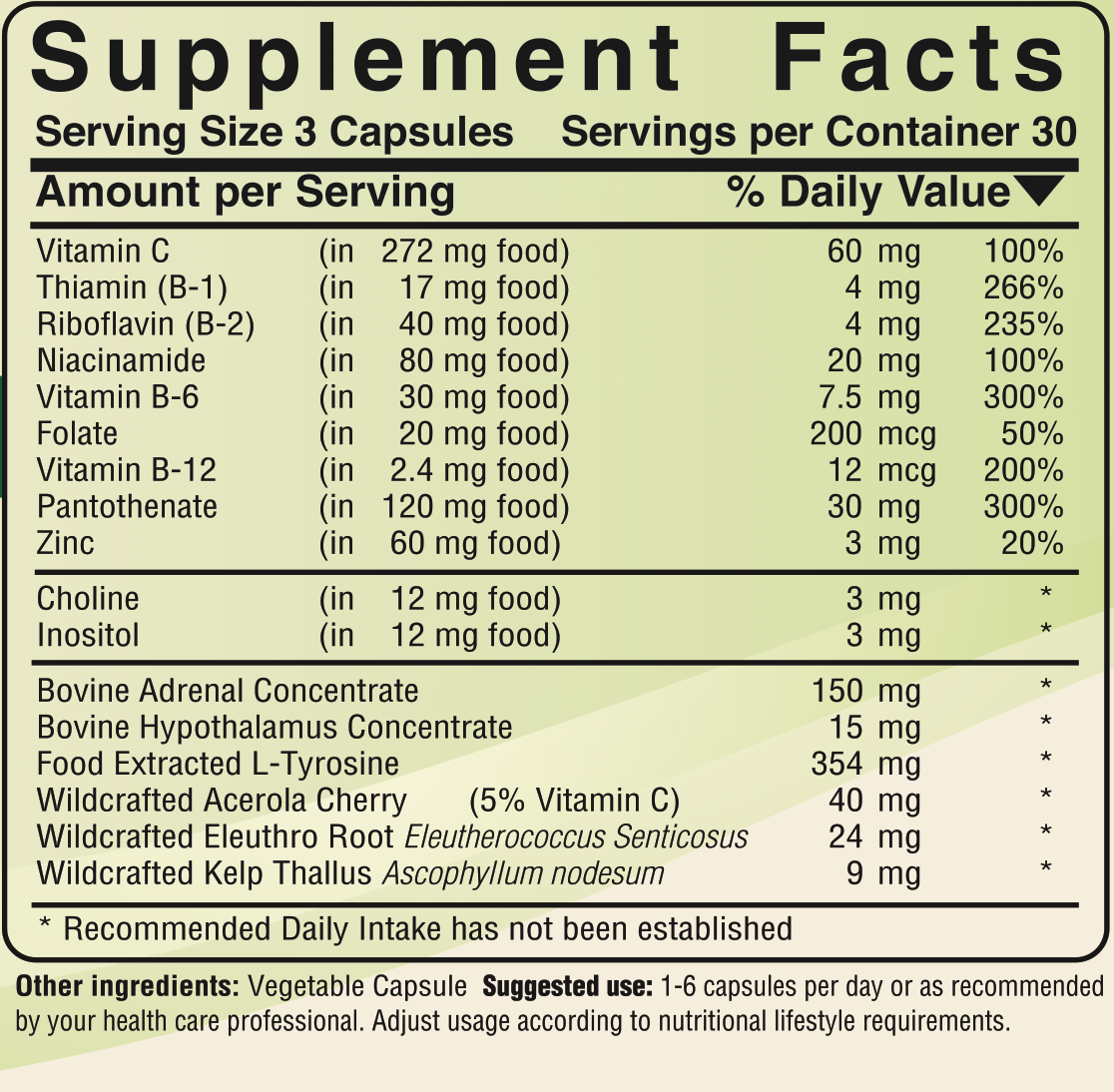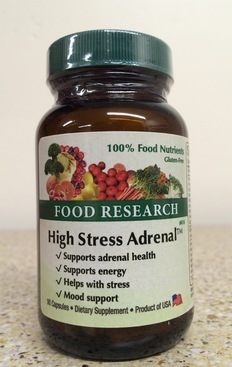
High Stress Adrenal
90 Capsules $33.98
90 Capsules $33.98
There is no doubt that we live in a high stress society. Not only do we live and work in unnatural environments, our foods are vastly different than they were 150 years ago. Until relatively recently, no human ever consumed synthesized isolated USP vitamins. Should stress vitamin formulas be primarily synthetic substances which can add stresses to the body? We think not! Food nutrients are natural for the body and are preferred for stress handling for humans.
Food Nutrients Do Not Even Look the Same as USP
Food nutrients are not structurally, nor in most cases chemically, the same as USP isolates (which are what most companies use). Electron microscopy reveals that isolated USP form vitamins have a crystalline appearance whereas Food nutrients have more of a rounded appearance. Food nutrients also appear smaller than USP form vitamins and minerals. Nutrition scientists understand that smaller particle size improves bioavailability [1], “Small particles greatly enhances digestion in the small intestine, because the smaller particles of food have a larger ratio of surface to mass” [2] (the main function of digestion is to get Food particles small enough to be absorbed by intestinal villi [1,2]).
 |
 |
|
| Food Vitamin C | Regular 'Natural' Ascorbic Acid |
Synthetic ‘nutrients’ do not do all the functions that natural ones do[3], so why would anyone want to take them?
Natural vs. Synthetic Vitamins and Stress
“Synthetic thiamin is usually marketed as thiamin hydrochloride or thiamin mononitrate” [4] and is a coal tar derivative [5] (most synthetic vitamins are petroleum derivatives). No thiamin hydrochloride or thiamin mononitrate is naturally found in food vitamin B-1 [2,3]. B vitamins and certain herbs have been shown to help reduce stress (e.g. pantothenate is even known as the “anti-stress vitamin”) [2,6,7]. Natural B-complex vitamins are necessary for energy metabolism and inadequate amounts can lead to pernicious anemia, low hemoglobin counts, skin problems, nervous system problems, and even serious mental problems [2]. B vitamins in yeast have long been known to be superior to isolated USP, petroleum-derived ones [8], which are what most companies seem to use in their B stress complex formulas--which are not really a complex, but normally a mixture of synthetic isolates.
One M.D. writes, “If anything helps you battle the effects of stress, it is vitamin C” [6]; vitamin C “can readily donate electrons to quench a variety of reactive free radical and oxidative species and is easily returned to its reduced state...The vitamin efficiently scavenges hydroxyl, peroxyl, and superoxide radicals, as well as reactive peroxide, singlet oxygen, and hypochlorite species” and protects against lipid and low-density lipoprotein (LDL) peroxidation” [2]. Research demonstates that the bioavailability of Food nutrients are greater than that of isolated USP vitamins [3,8,9]. Why should anyone take large amounts of cheap synthetic USP imitation vitamins (even if the labels say ‘natural’) which themselves can add stresses to the body?
How Much Better are Food Vitamins?
| Food Nutrient | Compared to USP Vitamin/Mineral Salt |
| Vitamin B-1, Thiamin | Not a different chemical compound |
| Vitamin B-5, Pantothenate | Not a different chemical compound |
| Vitamin B-6 | Not a different chemical compound |
| Vitamin B-9, Folate | More utilizable above 266mcg (RDI is 400mcg) [10] |
| Vitamin C | Up to 15.6 times antioxidant effect [11] |
Other Nutrients In High Stress Adrenal
Siberian ginseng is considered to be an adaptogen-which is a Food that increases stress-handling abilities and improves well-being [7,12]. “Siberian ginseng root contains bitter compounds that help the body quickly respond to stress. These compounds increase the production of DNA, RNA and proteins essential to all life processes. They stimulate the adrenal” [12]. “The main active component in ginseng consists of ginsenosides, a diverse group of steroidal saponins. There are twenty-five ginsenosides that have been separated...It is used internally for fatigue and debility, and for a decrease capacity for work and concentration” [7]. It has been found to reduce age-related cognitive impairment, have antineoplastic effects, antioxidant effects, antiplatelet effects, antiviral effects, and be beneficial in blood sugar regulation [7]. It is also used for anxiety [7]. Kelp is Food that supplies trace minerals [12].
The hypothalamus is the body’s master endocrine gland. It can increase tranquility [13]. The adrenal glands help the body deal with stress through the production of hormones including epinephrine and norepinephrine [13], but high stress weakens the adrenal glands [14] (note: all glandulars in B Stress Complex are bovine New Zealand source). L-tyrosine is an amino acid used in the production of adrenal and thyroid hormones [13] and may “improve vigilance and lessen anxiety” [15]. Whereas, S.O.D. “is one of the most important enzymes that functions as a cellular antioxidant...The absence of this enzyme is lethal” [2]. Studies show that antioxidant S.O.D. appears to have protective effects for the heart, lungs, joints, kidneys, liver, muscles, and skin [16].
High Stress Adrenal is often, simply an excellent option for helping in our high stress world.

High Stress Adrenal naturally contains carbohydrates, lipids, proteins (including all ten essential amino acids), iodine, and truly organic bioflavonoids as found in specially grown, enzymatically processed Saccharomyces cerevisiae, L-tyrosine, Mixed citrus fruit, New Zealand bovine glandular concentrates, Acerola cherry Malpighia glabra, Eleutherococcus senticosus (formerly known as Siberian ginseng), and Kelp thallus Ascophyllum nodesumall the nutrients shown above are contained in these foods. Unlike many so-called "natural" formulas, High Stress Adrenal is only comprised of foods, contains no synthetic USP nutrients or isolated mineral salts, but only contains foods, food complexes, and food concentrates.
Numerous university studies have concluded that supplements containing food nutrients are better than USP isolates. Food nutrients are better because they contain important enzymes, peptides, and phytonutrients CRITICAL to the UTILIZATION of vitamins and minerals which are not present in isolated USP nutrients. Published research has concluded that food vitamins are superior synthetic/USP vitamins.
Suggested use: 1-6 tablets per day or as recommended by your health care professional. Adjust usage according to nutritional lifestyle requirements.
References
[1] Jenkins DJA, Wolever TMS, and Jenkins AL. Diet Factors Affecting Nutrient Absorption and Metabolism. In Modern Nutrition in Health and Disease, 8th ed. Lea and Febiger, Phil.:583-602, 1994
[2] Shils ME, Olson JA, Shike J. In Modern Nutrition in Health and Disease, 8th ed. Lea and Febiger, Phil., 1994; 9th ed. Williams & Wilkins, Balt., 1999
[3] DeCava JA. The Real Truth About Vitamins & Antioxidants. A Printery, Centerfield (MA), 1997
[4] Macrae R, Robson RK, Sadler MJ. Encyclopedia of Food Science and Nutrition. Academic Press, NY, 1993
[5] Haynes W. Chemical Trade Names and Commercial Synonyms, 2nd ed. Van Nostrand Co., New York, 1955
[6] Understanding Vitamins and Minerals. Rodale Press, Emmaus (PA), 1984
[7] PDR for Herbal Medicine, 2nd ed. Medical Economics, Montvale (NJ), 2000
[8] Ha SW. Rabbit study comparing yeast and isolated B vitamins (as described in Murray RP. Natural vs. Synthetic. Mark R. Anderson, 1995, p:A3). Ann Rev Physiol,1941; 3:259-282
[9] Thiel R. Natural vitamins may be superior to synthetic ones. Med Hypo.2000;55(6):461-469
[10] Lucock M. Is folic acid the ultimate functional food component for disease prevention? BMJ, 2004;328:211-214
[11] Williams D. ORAC values for fruits and vegetables. Alternatives, 1999;7(22):171
[12] Pederson M. Nutritional Herbology: A Reference Guide to Herbs, 3rd ed. Whitman Books, Warsaw (IN), 1998
[13] Guyton AG, Hall JE. Textbook of Medical Physiology, 9th ed. W.B. Saunders Co., Phil., 1996
[14] Amberson JB, Gray GF. Adrenal pathology. In Adrenal Disorders. Thieme Medical Publishers: New York; 1983:13-36
[15] Specific nutrients aid in high-performance activity. Nutr Week, June 4, 1994:7
[16] Null G. The Clinician’s Handbook of Natural Healing, Kensington, NY, 1998
Some of these studies (or citations) may not conform to peer review standards. Therefore, the results are not conclusive. Professionals can, and often do, come to different conclusions when reviewing scientific data. None of these statements have been reviewed by the FDA. All products distributed by Doctors’ Research, Inc. are nutritional and are not intended for the treatment or prevention of any medical condition.
 |
||
|
||
